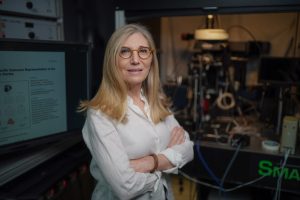Technion Researchers Awarded ERC Grants
Prestigious grants from the European Commission’s Horizon Europe program were awarded to two experienced Technion researchers with outstanding achievements over the past decade. Each of them will receive €2.5 million
Prof. Michael Glickman, dean of the Faculty of Biology, will receive the grant for studying “The origin and impact of impaired ubiquitin signaling in the degeneration of neurons.” Prof. Glickman and his team have developed an innovative model for studying Alzheimer’s disease using nerve cells derived from human stem cells. The research they propose is based on their hypothesis that impairment of the ubiquitin system, which clears cells of damaged proteins, could lead to the development of Alzheimer’s disease. With the help of their innovative experimental model, the grant will enable the researchers to identify the specific component in the ubiquitin system that contributes to the development of the disease in its early stages and better understand the underlying mechanism. The long-term aim is to develop novel treatments to repair brain damage in Alzheimer’s patients.
Prof. Jackie Schiller from the Ruth and Bruce Rappaport Faculty of Medicine will receive the grant for her research on “Dendrites as the main computational units for sustained motor learning in the brain cortex.” At the core of the research: an innovative hypothesis about how the brain manages to retain existing memories while learning new tasks – a challenge that artificial intelligence has not yet solved. According to Prof. Schiller’s hypothesis, these remarkable memory abilities are based on the ability of dendritic branches within brain cortex cells to store large amounts of information simultaneously. Another conjecture by Prof. Schiller is that disruptions in this mechanism are a key factor in various neurological disorders such as those involved in Parkinson’s disease.
The ERC Advanced Grant is one of Horizon Europe’s most prestigious and competitive grants, providing exceptional researchers with the opportunity to engage in ambitious, curiosity-driven projects that may lead to dramatic breakthroughs. The grants are dedicated to a wide range of research areas from life and physical sciences to social sciences and humanities.
Iliana Ivanova, commissioner for Innovation, Research, Culture, Education and Youth in the Horizon Europe program, said: “These grants will not only support leading researchers in pushing the boundaries of knowledge, but also create some 2,500 jobs for postdoctoral fellows, PhD students and other research staff across Europe. This investment nurtures the next generation of brilliant minds.”
Maria Leptin, president of the European Research Council (ERC), congratulated the winners and added: “I am particularly happy to see more mid-career scientists amongst the Advanced Grant winners this year. I hope that it will encourage more researchers at this career stage to apply for these grants.”




